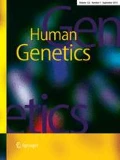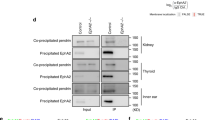Abstract
Enlarged vestibular aqueduct (EVA), known as the most common form of inner ear abnormality, has recently been of particular genetic interest because this anomaly is inherited in a recessive manner. The locus for non-syndromic sensorineural hearing loss with EVA has been mapped to the same chromosomal region, 7q31, as the Pendred syndrome locus. In the present study, seven mutations in the PDS gene (PDS), the gene responsible for Pendred syndrome, have been found in families of non-syndromic sensorineural hearing loss with EVA. One family is homozygous, three families are compound heterozygotes, and two families are heterozygous but with no other mutation detected. The present results provide evidence that mutations in PDS cause both syndromic and non-syndromic hearing loss.
Similar content being viewed by others
Author information
Authors and Affiliations
Additional information
Received: 21 October 1998 / Accepted: 5 December 1998
Rights and permissions
About this article
Cite this article
Usami, S., Abe, S., Weston, M. et al. Non-syndromic hearing loss associated with enlarged vestibular aqueduct is caused by PDS mutations. Hum Genet 104, 188–192 (1999). https://doi.org/10.1007/s004390050933
Issue Date:
DOI: https://doi.org/10.1007/s004390050933




